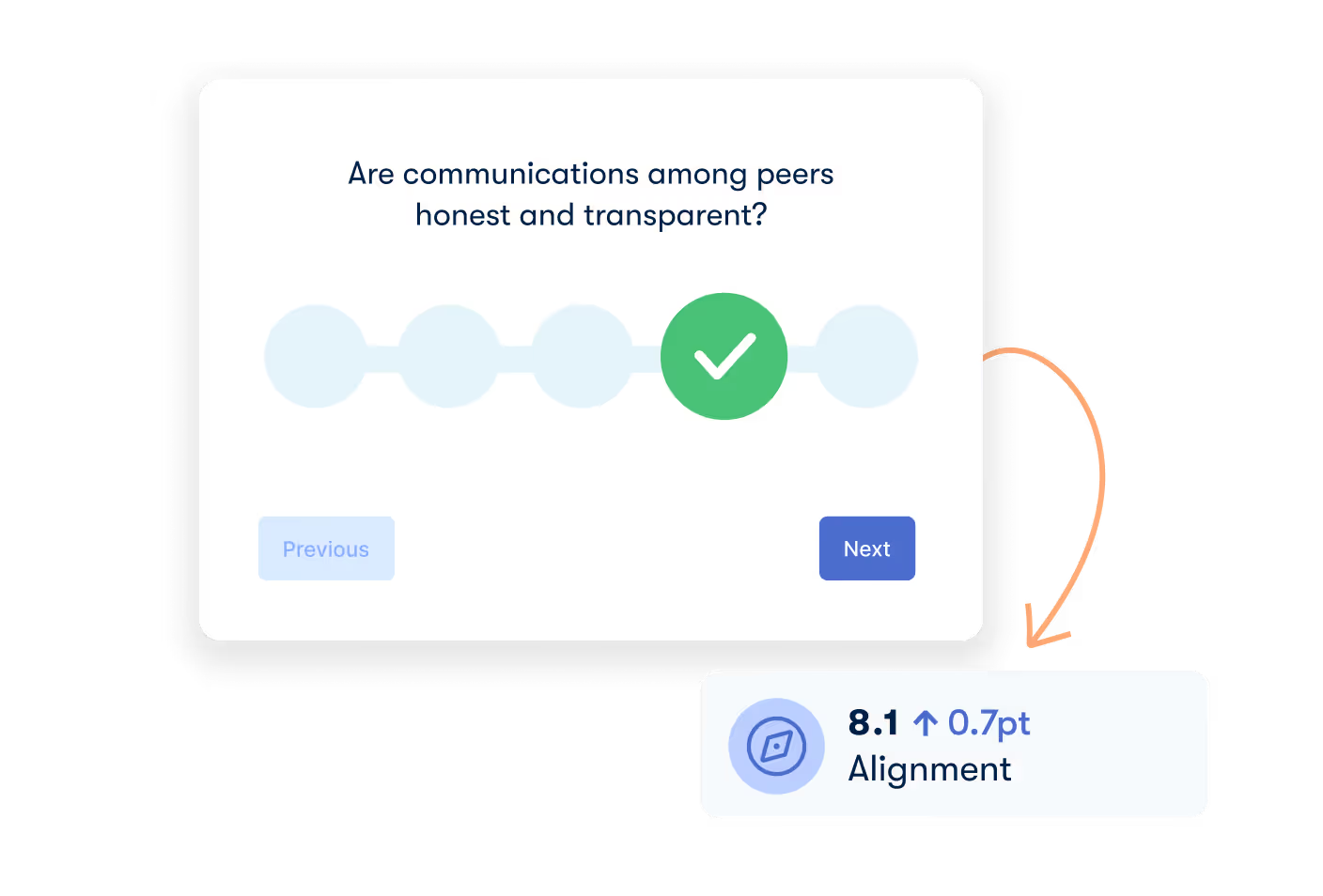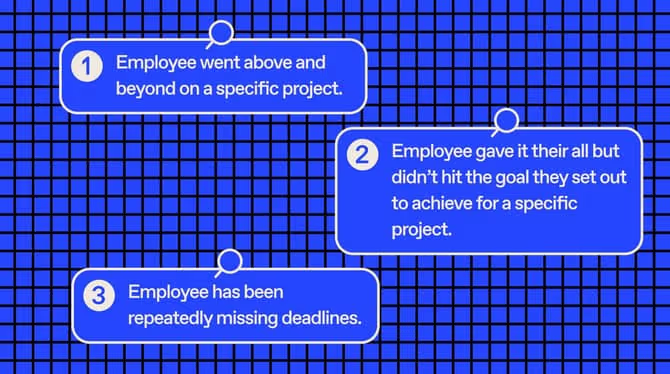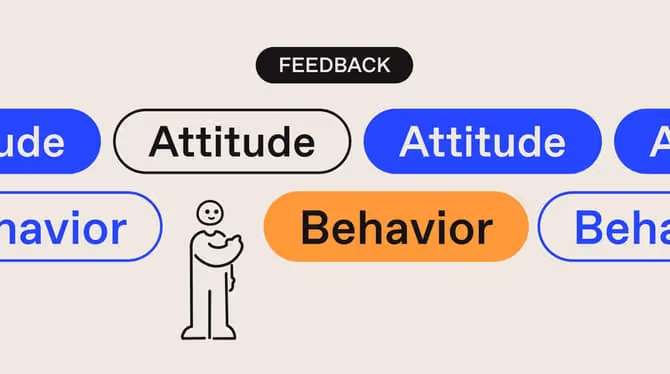12 Manager feedback examples for employees

Discover Workleap Officevibe's benchmark report on 12 key employee engagement metrics

One of the largest productivity killers is the mismatch between a team's goals and its manager's expectations. And when it comes to establishing effective workplace communication, there are two sides to the coin: feedback from managers to employees and feedback from employees to managers. Having two-way communication can open up many opportunities to make your team more productive and improve employee engagement.
We've put together a list of 12 relatable employee feedback examples for managers so that you can better identify the next time you need to address any concerns.
Why upward feedback is vital for managers
Nobody wants to hear negative feedback, no matter how constructive or accurate. However, since over 37% of employees say that they don't feel close to their manager, and 64% would like better feedback, upward feedback is essential for a company's growth.
Employees feel valued when their opinion matters. This feeling of value leads to higher motivation and participation and improved overall productivity. Many managers may not even know there's a problem, so by ignoring or disallowing critical feedback, they'll only find out about the issue when it blows up in their face.
That said, the power dynamic between employees and managers can make giving managers feedback a potentially fraught and dangerous thing to do. A manager that is less willing to listen may directly contribute to a toxic work culture that negatively affects everyone involved.
{emphasize}
The ability to give and accept feedback provides a clear understanding of potential problems and the overall performance of the entire team.
{emphasize}

12 examples of employee feedback for managers
Providing feedback to your manager in front of a mirror is easy, but executing it in real life can be more intimidating. We've compiled a list of common office grievances and employee feedback examples to discuss how to raise these issues with your manager.
1. The need for guidance
Some managers are highly hands-off, which can be a bonus for self-motivated employees but may also cause a potential lack of guidance and a feeling of uncertainty.
{emphasize}
One way to approach this would be:
I know you're busy, but could we maybe schedule more regular check-ins to ensure I'm on the right track for this project? Once I have a better idea of your expectations and the initial learning curve for the overall project, I think I'll be able to handle things independently.
{emphasize}
This type of interaction shows that you're willing to be proactive and independent while indicating that some potential communication issues might exist.
2. The micromanaging boss
At the opposite end of the spectrum, the micromanaging boss makes employees feel like their manager doesn't trust their skills, expertise, or judgment. Some teams may even think that they should let the manager do all the work since they want to have their hand in it all anyways. As a result, they start feeling demoralized and disengaged from their work.
{emphasize}
Possible ways to handle this include:
I appreciate your insights and instruction, but I think I'd learn more and perform better if I could figure out the goal and how to get there on my own.
While I enjoy the feeling of accomplishing my assigned tasks, I've started spending more time writing reports than focusing on my projects. Could we possibly switch to a weekly or monthly reporting schedule instead?
{emphasize}
3. The need for clear direction
Sometimes, a manager may assume that the team understands the expectations for a given project and so does not provide all the necessary details. This lack of direction can impact work performance from other team members and slow down a project. Often, the team makes mistakes that they could avoid if they only had clear goals.
{emphasize}
A good way to get a better sense of direction would be:
Thanks for trusting the team enough to let us freely approach this project and its goals. While working on the project, I noticed that I was unsure which goals were most important. Could you please provide some more clarification on which goals we should prioritize?
{emphasize}
4. Not getting recognition from management
Nothing is worse than putting your all into a project and not getting any recognition from senior leaders or peers.
Employees who feel unappreciated will often disengage from projects and do the bare minimum to avoid getting fired. In contrast, those who receive rewards for their performance feel an excellent boost to morale.
{emphasize}
If you feel your manager isn't providing enough employee recognition or positive feedback, try to bring it up in the following manner:
You had some great insights about our team performance on the previous project, but I noticed that many team members checked out early. Maybe we could start the meeting by providing more recognition to the whole team before moving on to improvements? It could help boost morale and get everyone interested and excited for the next project.
{emphasize}
5. Feeling burned out
Burnout stems from several factors, but a major contributor is too much work for one employee to handle. Your manager should try to keep track of how much every team member works per week. However, they may have many other things on their plate as well.
It's important not to shy away from sharing that you're feeling overworked.
{emphasize}
A way to indicate that may need a bit of breathing room would be:
After evaluating my current tasks for the month, I don't think I am able to take on an extra task. I currently spend 25 hours per week on [x] and an additional 10 on [x]. Taking on more work would cause my existing work to suffer, and I wouldn't be able to perform as well as you'd need me to on the new task. Could we perhaps meet to discuss adjusting my workload for optimal performance?
{emphasize}
6. Work-life balance concerns
Many managers assume that their employees have the same priorities as themselves, leading to work-life conflicts.
{emphasize}
Constructive feedback examples include:
I admire your drive to get our work done, and I appreciate your hands-on approach. But it has started bleeding into my personal time. Could we maybe schedule a meeting to develop a more efficient "during working hours" path forward?
{emphasize}
7. Resolving intra-team conflict
Inevitably, every group setting will eventually see some conflict. While problem-solving skills and strong leadership skills can minimize the friction, your manager still needs to know about it.
{emphasize}
Start the conversation with:
Recently, our team has had some conflicts that have affected our performance and ability to work together. What would you think about instituting a manager-led resolution process that leverages your authority and leadership ability to guide us to the best course of action?
{emphasize}
8. Employee favoritism
Employee favoritism can decrease morale, reduce employee participation, and even foster a hostile work environment.
{emphasize}
You may wish to bring the matter to human resources, but if you feel confident about your relationship with the manager, this might be a good place to start:
I was looking forward to improving my skills by working with a new client. Could you provide some feedback on why I wasn't chosen?
{emphasize}
9. Words of encouragement
Just like employees, managers appreciate being seen and appreciated. From team leaders to senior managers, all managers love receiving positive affirmations. By developing a relationship with their employees, they are more likely to respond positively to feedback in the future.
{emphasize}
You can thank your manager privately or publicly, using something similar to this:
Thank you so much for recognizing our team's recent accomplishments on the last project; we couldn't have done it without your direction and guidance. We look forward to tackling the next challenge and taking our performance to the next level.
{emphasize}
10. Giving constructive feedback in a timely manner
Approximately one in four employees feel that they don't receive adequate-enough feedback on their work to help them improve and grow. Managers are often overwhelmed with work and can't provide timely feedback to their employees.
{emphasize}
If you only see your manager during your performance review, you might raise the subject this way:
I understand that you have a lot on your plate, but it would boost team morale if we had more frequent constructive feedback sessions. That way, we can fine-tune our performance and exceed our current productivity.
{emphasize}
11. Getting insights for growth and development
If you've gotten stuck in a role and don't see any opportunity for advancement, it may be time to schedule an upward feedback session.
{emphasize}
If you're putting in the effort but not seeing the results you expect, consider starting with:
I'm passionate about my current work, but I would like additional opportunities for development and growth. Can we meet to discuss my potential and what you think I might be able to do to advance further in the company?
{emphasize}
12. Concerns about time management
Having too many or too few tasks in your workload can hurt your ability to produce high-quality work. Of course, that affects your morale.
{emphasize}
Start the conversation with:
I've noticed recently that my work is suffering because I can't allocate enough time to do each task properly. Can we schedule a meeting to identify which tasks need priority and develop a more equitable schedule for the entire team?
{emphasize}
Best practices for giving feedback to managers
Giving unwanted feedback can have negative consequences, so it's vital to prepare your talking points and input before the conversation. Feedback for a manager is much the same as a manager giving effective employee feedback and reaps many similar benefits.
Here are some ways to ensure that you provide effective feedback to your manager and get the positive results you expect.
Ask if your manager wants feedback
Some managers may still believe in top-down management and may not want to receive feedback or want you to share feedback based on management decisions or style. If that's the case, you might way to bring up the issue with HR, as it can have a negative impact on your career development and professional growth.
And sometimes, it's just a matter of timing! Managers can be especially busy, try your best to find the right time to approach the subject. Ask them beforehand if now is the right time to talk, or if you could schedule time in the near future to chat.
Lead with facts
Effective employee feedback should be neutral and focus on specific examples. While you want to provide honest feedback, you don't want to come across as critical or harsh, as this will make receiving feedback almost impossible. Always make it clear that you're talking from your own experiences and that you're aware that you don't have the complete picture.
{emphasize}
Officevibe's employee Pulse Surveys help you see the whole picture of how your team is really doing. Each week, employees are prompted to answer 5 questions (anonymously, if they like) so that managers get real-time feedback from direct reports on the regular.
{emphasize}

Find mutual goals
Make sure that you're on the same page and focus on things that are important to your manager. Use a feedback conversation to identify common goals and strategies and leverage employee and managers feedback to focus on mutual interests.
{emphasize}
Positive feedback framing as morale-booster
A great way to provide constructive criticism is the feedback sandwich:
- Start with praise for positive behavior.
- Bring up the actual concern.
- Finish with another positive statement.
{emphasize}
Agree to disagree
Sometimes, your feedback to your manager may meet with resistance, especially if you're giving negative feedback. Know when to step back and understand that you and your manager likely do not have the same perspective on an issue.
Phrase feedback as a question
By phrasing feedback for managers as a question, you show empathy by putting yourself in their shoes. The question forces the manager to consider the feedback and perhaps find a solution-oriented answer.
Should employees give honest feedback to managers, even negative feedback?
In an ideal world, yes. Two-way feedback has many benefits and is extremely important for both managers and employees alike. However, in the real world, some managers may not appreciate unsolicited feedback or any negative criticisms of the manager's performance.
{emphasize}
It's best to use your judgment and always ask your manager if they want to hear what you have to say or if now is the right time before delivering feedback — especially if your manager feedback consists mainly of negative feedback.
{emphasize}
Using the right tools for employee feedback for managers
Constructive feedback is an important component of a successful company, but giving feedback to managers can become challenging due to power dynamics and corporate culture. Gone are the days of anonymous feedback boxes in the front lobby.
Officevibe's employee feedback tool allows for anonymous feedback to reduce the impact of power dynamics and improve the employee experience of giving positive and negative feedback. Not only does the platform enable employees to share feedback easily, but it also automates the way managers can collect and organize feedback so that they can address it promptly.
{emphasize}
If you want to have maximized efficiency, rewarding performance from employees, and boosted company morale, Officevibe's complete employee feedback software is sure to meet your needs.
{emphasize}
Give HR and managers the clarity, confidence, and connection to lead better every day.












.png)